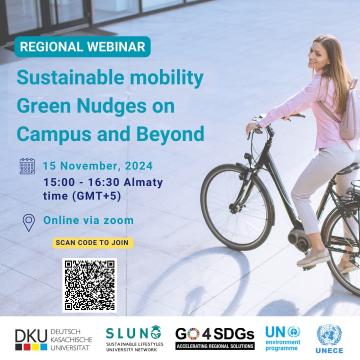
Friday, 15 November 2024
15:00 - 16:30 Almaty time (GMT+5), 11:00 - 12:30 CET
Overview
The transport sector is responsible for approximately one quarter of greenhouse gas emissions. 95% of the world's transport energy still comes from fossil fuels. The pursuit of sustainability requires a shift in people minds, where the use of private vehicles gives way to different modes of public transport like buses, bicycles, car sharing, electric cars and walking lanes. Sustainable mobility strives to integrate eco-friendly practices into transportation, focusing on minimizing greenhouse gas emissions, reducing dependency on non-renewable energy sources and promoting public health.
Cities in Central Asia are often associated with strong air pollution and rising greenhouse gas emissions from urban transport, in contrast with global efforts for a carbon-neutral world by 2050. In the light of sustainable development, it is, therefore, the objective to join the efforts to reduce the externalities of urban mobility and logistics. Behavioral science shows that a simple “nudge” towards everyday greener decisions is a powerful spur to environmental action for students and other campus community members to address these challenges.
The United Nations Environment Programme (UNEP) is actively contributing to a more sustainable and resilient future in the transport sector in cities. UNEP’s focus includes decarbonizing transport, promoting active mobility, embracing digitalization, advancing electric mobility, regulating used vehicles, and advocating for clean fuels and vehicles.
The United Nations Economic Commission for Europe (UNECE) Environment and Transport programmes collaborate with the World Health Organization (WHO) in the Transport, Health and Environment Pan-European Programme – THE PEP is implemented primarily through partnerships tackling topics such as active mobility, sustainable tourism mobility and green jobs.
Universities as large institutions and usually extensive building complexes can be both suffering from unsustainable transportation habits and at the same time contributing significantly towards changing those habits. Many universities worldwide are initiating and implementing sustainable mobility action plans that aim at changing the mobility habits of students and staff members towards more sustainable transport modes.
The webinar is implemented by UNEP Global Opportunities for Sustainable Development Goals (GO4SDGs) and UNECE–WHO Transport, Health and Environment Pan-European Programme in close partnership with the Kazakh-German University, targeting support of Sustainable Lifestyles on campus and beyond in Central Asia and the South Caucasus to reduce the unsustainable use of natural resources through a "net zero living" behavioral pattern.
Objective
The webinar targets discussion on the need for and showcasing best practices of green nudges in sustainable mobility applicable in the campuses of Central Asia and the South Caucasus.
Participants
Universities, upper/graduate students, sustainable development experts and practitioners, private sector, civil society representatives from the regions of the South Caucasus and Central Asia as well as international organizations.
The event will be held online with simultaneous Russian-English translation and recorded.
